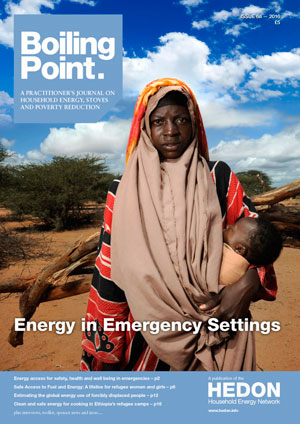UNHCR and Alliance Team Up on Boiling Point’s “Energy in Emergency Settings” Issue
This year the first ever World Humanitarian Summit will take place in Istanbul, where energy leaders will encourage decision makers to address the urgent need for increased access to cleaner and more efficient cookstoves, fuels, and renewable energy products in humanitarian settings. Capitalizing on this opportunity to share knowledge and raise awareness, the Alliance joined with the UN High Commissioner for Refugees (UNHCR) and HEDON to publish an “emergency energy issue” of Boiling Point magazine, which is internationally recognized as the leading journal in the household energy for development sector.
Inside the New Issue
The new Boiling Point issue explores diverse aspects of emergency energy access, including report summaries, best practices and expert responses. At the heart of this issue are the words of Alima Mohamed, a Refugee Leader at The Nakivale Settlement in Uganda. Alima not only brings to light the burden of energy poverty from a refugee perspective, but more importantly highlights the incredible bottom-up capacity of refugees to create, deliver and promote energy access solutions for their own communities – if only they were empowered to do so.
Wanting her message to be taken to the upcoming Summit, Alima says “You can tell them: I am Alima, I’m a woman and we cannot live without light here. If we get light, we can work and if we can work we can do anything”.
Lack of Energy Access
The principal article in the issue focuses on the lack of energy access in emergency and humanitarian settings. Today there are more than 59.5 million refugees and internally displaced people (IDPs) worldwide that have fled their homes due to war and conflict, and another 97 million people that have been affected by natural disasters. Many of these people have no option but to use three-stone fires and traditional fuels for cooking and lighting, negatively impacting their health, environment, food security, and safety. While millions of refugees receive food from humanitarian agencies, they often receive food like rice that must be cooked before it can be eaten. In camps in north Darfur, 80% of IDPs interviewed reported selling food from their World Food Programme ration to buy firewood, and on average they missed three meals a week when they had food but had no fuel to cook it. In this issue, we take a closer look at the Sustainable Energy for Food (SE4food) Guidelines which links technical capacity and field experience to provide information on a wide number of technologies for cooking, food preservation, water pumping and purification, and electric power supply for use in humanitarian settings.
Not surprisingly, in emergency settings, women and girls are hit the hardest. UNHCR assessments in central and east Africa show that on average refugee women walk more than five hours each trip to collect firewood for cooking and heating, putting them at risk for physical and sexual attack and injury. Assessments in Chad found that 42% of refugee households experienced incidents of assault, attempted rape, rape, or other forms of sexual gender based violence during firewood collection over just six months. Long hours spent collecting firewood stops women and girls from utilizing that time for education, business, child care, or rest. Further, lack of access to fuel for lighting prevents children from studying at night and increases women’s vulnerability when navigating camps to use latrines and other services. Articles in this issue from the Women’s Refugee Commission and Gaia Association explore the need for clean cookstoves and share how the Safe Access to Fuel and Energy (SAFE) Humanitarian Working Group works to protect women and girls from violence in humanitarian settings.

Boiling Point is published by HEDON Household Energy Network – a knowledge sharing and networking forum. Despite its large online readership, Boiling Point continues to recognize and target household energy practitioners who are often ‘unreachable’ given their lack of internet access. By posting free journal hardcopies to this critical audience, HEDON reaches 15,000 off-line readers in 108 different countries with every issue of Boiling Point.
We hope you enjoy reading the latest issue of Boiling Point from HEDON. To download it, click: Boiling Point 68: Energy In Emergency Settings.
